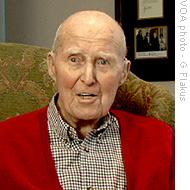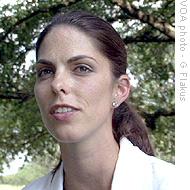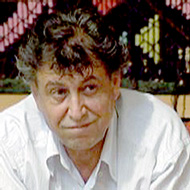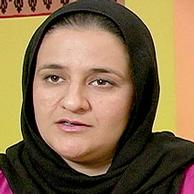VOA慢速英语 2008 1224b
时间:2018-12-01 作者:英语课 分类:VOA慢速英语2008年(十二)月
I'm Steve Ember.
VOICE TWO:
And I'm Barbara Klein with EXPLORATIONS in VOA Special English. Today we tell about four more individuals who are making a difference in the world. Each person is helping 1 others in special ways.
(MUSIC)
VOICE ONE:

Norman Borlaug
Our first person who is making a difference is known around the world. He is often described as the man who has saved more lives than any other person in history. Norman Borlaug is considered the father of what has been called the Green Revolution. His ideas about agriculture increased crop production and ended hunger in many nations. Mister Borlaug continues to be a leader among agricultural researchers.
VOICE TWO:
Norman Borlaug was born ninety-four years ago on a farm in the American state of Iowa. In the middle of the twentieth century, world population was expanding faster than food production. Experts said many people in developing countries would face starvation.
Norman Borlaug was an agricultural researcher at the International Maize 2 and Wheat Improvement Center in Mexico. He developed methods of growing wheat that increased the amount harvested by three times. He later repeated this success in India, Pakistan and Africa.
His methods of farming saved millions of people who would have starved to death. Norman Borlaug was given the Nobel Peace Prize for his efforts in nineteen seventy.
VOICE ONE:

Julie Borlaug
Mister Borlaug is still urging experts to think about the needs of people around the world. His latest concern is a disease in wheat called UG ninety-nine. He says it has the power to destroy most of the wheat being grown around the world. He says reductions in agricultural programs have made it harder to take action against such threats.
Mister Borlaug's granddaughter Julie works at the center named for him at Texas A&M University in Dallas. She says his worry about food problems rises from the belief that hunger is unacceptable. She says Norman Borlaug still believes it is our responsibility as human beings to feed one another.
(MUSIC)
VOICE TWO:
Our next individual who is making a difference has come a long way from living in homeless shelters and the streets of Newark, New Jersey 3. Twenty-five year old Rahfeal Gordon was honored this year by the National Foundation for Teaching Entrepreneurship 4. He was recognized for giving speeches that urge young people to improve their lives.
Mister Gordon tells people: "If nobody ever says that you're brilliant, say it to yourself every day. Look yourself in the mirror. If you have survived something, I don't care how small, how big, you've survived it."
VOICE ONE:

Rahfeal Gordon
Rahfeal Gordon's message is simple: He tells the story of his own life in three parts. Each begins with words from hip-hop songs that he knows will be meaningful to young people.
Mister Gordon uses words from hip-hop songs to help young people, especially those who grew up with poverty and abuse, as he did. His speech is called "Hip-Hop Saved My Life."
Mister Gordon says he listened to performers like Jay-Z, Tupac Shakur and Kanya West during hard times in his life. He says their songs helped him.
VOICE TWO:
Mister Gordon says he had a happy childhood until his parents became dependent on drugs. Then his father began to beat his wife and sons. So they left home, and lived on the streets and in homeless shelters. He says his grandparents helped him survive.
After his brother was murdered, Rahfeal Gordon decided 5 he wanted to help people. "I can't be Superman," he says. "I can't save the world, but I think if I can help an individual, I am saving the world."
Mister Gordon says he hopes to speak to young people across the United States and in other countries. This year, he received an award for social entrepreneurship from the National Foundation for Teaching Entrepreneurship. The award recognizes young people who start businesses that help people or communities.
(MUSIC)
VOICE ONE:

Lolan Sipan
Our next individual making a difference is Lolan Sipan, a Kurdish anthropologist 6 in northern Iraq. Anthropologists study human cultures and societies. Mister Sipan is working to save the traditions of Kurdistan's nomadic 7 shepherds.
The nomadic tribes 8 live in the mountains of Iraqi Kurdistan as they have for thousands of years. The shepherds travel from place to place and raise sheep. For months at a time, they live in temporary shelters in the highlands, caring for the animals. Not much is known about the lives of the shepherds. But Lolan Sipan wants to change that.
VOICE TWO:
Lolan Sipan is attempting to gather information about the number of tribes and the number of families. He also wants to learn about the lives of the women and children, and the tribes' struggle for survival 9.
Each summer, Mister Sipan travels to where the shepherds live. Life is not as peaceful as it appears because of Turkish and Iranian military threats. For example, Mister Sipan found an unexploded bomb in one area.
VOICE ONE:
Life is also not easy for the nomadic shepherds. One woman told him about the danger and high costs of caring for sheep. The woman makes traditional cheese from sheep's milk. But she earns little money from selling the cheese.
Mister Sipan has asked United Nations agencies and government officials to help the nomads 10 in Kurdistan. He says their culture would disappear within years if nothing is done soon. He says fifty percent of Kurdistan's nomads have permanently 11 settled in villages in the past ten years.
VOICE TWO:
Lolan Sipan is showing a traditional nomadic home, a black tent made of goats' hair. The tent is in the Iraqi city of Irbil, on the top of a museum.
Mister Sipan started the museum four years ago to show the nomads' traditional arts and crafts, including weaving with cloth. He says more people come to the museum each year. There were almost fifty thousand visitors in two thousand seven.
Earlier this year, Mister Sipan received money from the United States to help support traditional arts. Older nomadic tribeswomen are now passing their sewing and weaving skills to a new generation of women.
(MUSIC)
VOICE ONE:
Our next individual, Rangina Hamidi, was born in Afghanistan. Her family left Kandahar when she was a young child and later settled in the United States. This was after the Soviet 12 Union invaded her country. The Taliban rule that followed the Soviet occupation made life terrible for women in Afghanistan. Women still face difficult problems even after the ouster of the Taliban government.
VOICE TWO:

Rangina Hamidi
Miz Hamidi returned to Afghanistan seven years ago to help improve the lives of women in Kandahar. She is working with a non-profit organization, Afghans for Civil Society. The goal is to help Afghan women learn skills that will give them economic independence. The first goal was starting an independent radio station in Kandahar. The next was an economic project.
Women in the project make hand-sewn embroidery 13 products. The project started with only twenty women and grew to four hundred fifty women in five years. Local activists 14 also established a Women's Council in Kandahar. Many activists say they are working to increase women's rights and chances for success.
VOICE ONE:
Rangina Hamidi started a company that sells the women's embroidery pieces in the international market. The company is called Kanadahar Treasures. She says she will give it to the Afghan women when the company becomes successful. Miz Hamidi says she still worries about the future of Afghanistan. She says Afghans must take their own share of responsibility in their country.
Rangina Hamidi and the Afghan women she works with face problems every day. These include power shortages 15, lack of clean water, rising corruption 16 and danger from resistance fighters. But she looks forward to increasing her involvement in the rebuilding of her homeland in the future.
(MUSIC)
VOICE TWO:
This program was written by VOA correspondents 17 and adapted by Shelley Gollust. Our producer was Mario Ritter. I'm Barbara Klein.
VOICE ONE:
And I'm Steve Ember. You can find stories about other people who are making a difference on our Web site, voaspecialenglish.com. Join us again next week for EXPLORATIONS in VOA Special English.
- The poor children regularly pony up for a second helping of my hamburger. 那些可怜的孩子们总是要求我把我的汉堡包再给他们一份。
- By doing this, they may at times be helping to restore competition. 这样一来, 他在某些时候,有助于竞争的加强。
- There's a field planted with maize behind the house.房子后面有一块玉米地。
- We can grow sorghum or maize on this plot.这块地可以种高粱或玉米。
- He wears a cotton jersey when he plays football.他穿运动衫踢足球。
- They were dressed alike in blue jersey and knickers.他们穿着一致,都是蓝色的运动衫和灯笼短裤。
- Spawr indeed personified American ingenuity, self-reliance, initiative and entrepreneurship. 斯帕尔看不上机构重叠和清规戒律,表现出美国人的机敏,有着独立、首创精神和企业家的风度。
- He provides evidence that n-achievement is highly correlated with entrepreneurship. 他提供的材料表明“n--成就”与企业家精神高度相关。
- This gave them a decided advantage over their opponents.这使他们比对手具有明显的优势。
- There is a decided difference between British and Chinese way of greeting.英国人和中国人打招呼的方式有很明显的区别。
- The lecturer is an anthropologist.这位讲师是人类学家。
- The anthropologist unearthed the skull of an ancient human at the site.人类学家在这个遗址挖掘出那块古人类的颅骨。
- This tribe still live a nomadic life.这个民族仍然过着游牧生活。
- The plowing culture and the nomadic culture are two traditional principal cultures in China.农耕文化与游牧文化是我国传统的两大主体文化。
- tribes living in remote areas of the Amazonian rainforest 居住在亚马孙河雨林偏远地区的部落
- In Africa the snake is still sacred with many tribes. 非洲许多部落仍认为蛇是不可冒犯的。 来自《简明英汉词典》
- The doctor told my wife I had a fifty-fifty chance of survival.医生告诉我的妻子,说我活下去的可能性只有50%。
- The old man was a survival of a past age.这位老人是上一代的遗老。
- For ten years she dwelled among the nomads of North America. 她在北美游牧民中生活了十年。
- Nomads have inhabited this region for thousands of years. 游牧民族在这地区居住已有数千年了。 来自《简明英汉词典》
- The accident left him permanently scarred.那次事故给他留下了永久的伤疤。
- The ship is now permanently moored on the Thames in London.该船现在永久地停泊在伦敦泰晤士河边。
- Zhukov was a marshal of the former Soviet Union.朱可夫是前苏联的一位元帅。
- Germany began to attack the Soviet Union in 1941.德国在1941年开始进攻苏联。
- This exquisite embroidery won people's great admiration.这件精美的绣品,使人惊叹不已。
- This is Jane's first attempt at embroidery.这是简第一次试着绣花。
- His research work was attacked by animal rights activists . 他的研究受到了动物权益维护者的抨击。
- Party activists with lower middle class pedigrees are numerous. 党的激进分子中有很多出身于中产阶级下层。 来自《简明英汉词典》
- Food shortages often occur in time of war. 在战争期间常常发生粮食短缺的情形。 来自《现代汉英综合大词典》
- At the same time, worldwide food and fuel shortages eased. 同时,世界性粮食和石油短缺的现象终止了。 来自英汉非文学 - 政府文件
- The people asked the government to hit out against corruption and theft.人民要求政府严惩贪污盗窃。
- The old man reviled against corruption.那老人痛斥了贪污舞弊。
- The New York Times has correspondents in France, Germany, and other countries. 《纽约时报》在法国、德国和其他国家都有特派[驻外]记者。 来自《现代英汉综合大词典》
- They said foreign correspondents who stayed too long in a place went blind. 他们说,驻外记者在一个地方待得太久就变得不能发现新事物了。 来自《简明英汉词典》